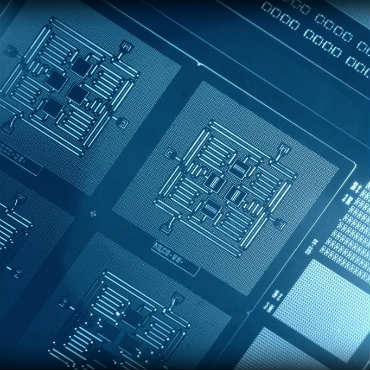IARPA, IBM look to advance quantum computing
IBM scientists say they have solved a crucial problem in quantum computing, just in time for an upcoming IARPA event on the subject.

IBM scientists have designed a square lattice quantum computing chip that helps correct for the quantum errors that limit this approach to high-power computing. (Photo: IBM)
While the research arm of the country's intelligence services looks for ideas on how to advance a practical quantum computer that could revolutionize data processing, IBM scientists unveiled what the company called "two critical advances" toward making such a machine.
The computer scientists said in a paper published in the journal Nature Communications that, for the first time, they showed the ability to detect and measure two nagging kinds of quantum errors -- bit-flip and phase-flip errors that will occur in any real quantum computer -- simultaneously. This was done using a new, square quantum bit (qubit) circuit design that is the only physical architecture that could successfully scale to larger dimensions, according to IBM.
Quantum computers use quantum mechanics to process huge amounts of data, which would provide a substantial leap ahead in processing capabilities compared to current digital-based computers.
That's why the intelligence community, faced with exploding data processing needs, is set to look into the technology in May.
The Intelligence Advanced Research Projects Activity (IARPA) announced earlier in April that it would host a Proposers' Day on May 19 to provide information to potential vendors on the objectives of an anticipated broad agency announcement for its Logical Qubits (LogiQ) program.
IBM plans to attend the event, the company said in an April 30 statement to FCW.
The LogiQ project, in IARPA’s Safe and Secure Operations Office, is looking for creative technical solutions to encoding imperfect physical qubits into a logical qubit that protects against system deterioration, errors and harmful outside environmental influences.
Until now, IBM said, it was possible to address only one type of quantum error or the other, but never both at the same time. Addressing both is a necessary step toward quantum error correction, which in turn is a critical requirement for building a practical and reliable large-scale quantum computer.
Quantum computing offers exponential increases in power, far outstripping today's supercomputers. According to IBM, if a quantum computer could be built with just 50 qubits, no combination of today’s top supercomputers could successfully outperform it.
"We are at the birth of the quantum computing industry," Jerry Chow, manager for the experimental quantum computing group at IBM Research, told FCW. "If built, quantum computers have the potential to unlock new applications for scientific discovery and data analysis and will be more powerful than any supercomputer today."
The IBM research was funded through IARPA's Multi-Qubit Coherent Operations Program, according to a statement IARPA provided to FCW.





